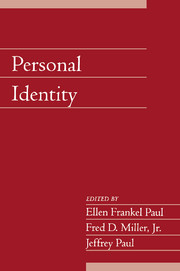Book contents
- Frontmatter
- Contents
- Introduction
- Acknowledgments
- Contributors
- Experience, Agency, and Personal Identity
- When Does a Person Begin?
- Persons, Social Agency, and Constitution
- Hylemorphic Dualism
- Personal Identity and Self-Ownership
- Self-Conception and Personal Identity: Revisiting Parfit and Lewis with an Eye on the Grip of the Unity Reaction
- The Normativity of Self-Grounded Reason
- Rationality Means Being Willing to Say You're Sorry
- Personal Identity and Postmortem Survival
- “The Thing I Am”: Personal Identity in Aquinas and Shakespeare
- Moral Status and Personal Identity: Clones, Embryos, and Future Generations
- The Identity of Identity: Moral and Legal Aspects of Technological Self-Transformation
- Index
“The Thing I Am”: Personal Identity in Aquinas and Shakespeare
Published online by Cambridge University Press: 05 July 2014
- Frontmatter
- Contents
- Introduction
- Acknowledgments
- Contributors
- Experience, Agency, and Personal Identity
- When Does a Person Begin?
- Persons, Social Agency, and Constitution
- Hylemorphic Dualism
- Personal Identity and Self-Ownership
- Self-Conception and Personal Identity: Revisiting Parfit and Lewis with an Eye on the Grip of the Unity Reaction
- The Normativity of Self-Grounded Reason
- Rationality Means Being Willing to Say You're Sorry
- Personal Identity and Postmortem Survival
- “The Thing I Am”: Personal Identity in Aquinas and Shakespeare
- Moral Status and Personal Identity: Clones, Embryos, and Future Generations
- The Identity of Identity: Moral and Legal Aspects of Technological Self-Transformation
- Index
Summary
I. Four Irreducibly Distinct Explanations of Personal Identity
Questions about identity are questions about what some object of attention and inquiry is and whether it is the same as, or different from, another object of attention and inquiry. So, for example, one might attend to the uttering of this paragraph, on some occasion, by a speaker. Considering the speaking source of the beginning of the utterance and the speaking source of the end of it, one might ask whether—and if so, how and why—one and the same object, this speaking person, was the source of the whole utterance. Explanatory affirmations or denials of identity will be as irreducibly various as the kinds of explanation that, in any field of inquiry whatever, are available for fruitfully answering pertinent questions.
At the beginning of his commentary on what in fact, though not in name, is Aristotle's main treatise on persons, the Nicomachean Ethics, Thomas Aquinas set out what he considered the four irreducibly distinct kinds of explanation (i.e., of scientia), corresponding to four irreducibly distinct aspects of reality or, more precisely, real kinds of order. Followers of Aquinas have, to their cost, paid scant attention to this foundational analysis. More generally, many of the failures that mark the history of philosophy and learned discourse involve neglect of the fundamental complexity of reality and the corresponding necessity of diverse kinds of explanation.
- Type
- Chapter
- Information
- Personal Identity , pp. 250 - 282Publisher: Cambridge University PressPrint publication year: 2005
- 2
- Cited by

